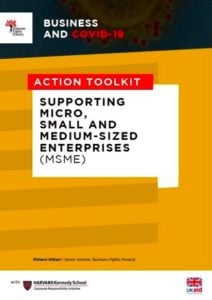As MSMEs struggle, the impact on their communities is also significant as they are often the only source of goods and key services for the most poor and vulnerable populations. For large companies, who rely on MSMEs in their value chains as suppliers (including small-scale farmers), distributors, retailers and customers, beyond the immediate humanitarian imperative, supporting them through the COVID-19 crisis will be critical to ensuring supply chain resilience, business continuity and recovery in the months ahead. The new Business and COVID-19 Response Centre now hosts an Action Toolkit to help companies to support their MSMEs partners.
There are several practical ways that large companies can act now through their core business, philanthropy and policy engagement to support their MSME partners through the crisis. To help stimulate thinking and action within companies and between partners, Business Fights Poverty and the Corporate Responsibility Initiative at the Harvard Kennedy School have produced a practical guide, structured around an action framework developed together by the organisations.
Core business
 First, through the core business, large companies with direct relationships with MSMEs, can help to reinforce existing public health messages and provide health and hygiene information for business partners to share with workers and communities. Small retailers, for example, often act as community hubs and are ideally placed to share information with their communities. Large companies, who do not have a direct relationship with informal MSMEs in their value chains, can still work with their suppliers, business partners, donors and NGOs with established networks and relationships, to get information out.
First, through the core business, large companies with direct relationships with MSMEs, can help to reinforce existing public health messages and provide health and hygiene information for business partners to share with workers and communities. Small retailers, for example, often act as community hubs and are ideally placed to share information with their communities. Large companies, who do not have a direct relationship with informal MSMEs in their value chains, can still work with their suppliers, business partners, donors and NGOs with established networks and relationships, to get information out.
Second, it is vital that large companies take all reasonable steps to keep their MSME partners in business. First and foremost, MSMEs need help with cash flow and here large companies should consider introducing greater contractual flexibility, for example paying small suppliers straight away. They can also offer direct financial support through cash grants, extending credit or making affordable loans, and work with banking and technology partners to make financial support quick and easy for MSMEs to access, especially through digital technology and payments.
Third, large companies need to help MSMEs to adapt to new market conditions. They can work with MSMEs to re-focus on products and services that meet new areas of demand, enabling them to generate fresh sources of revenue and to re-assign workers to other jobs. For example, helping small scale retailers to focus more on distributing essential health products and providing health advice and information. Large companies with existing MSME support programmes can also work with their implementation partners to re-orientate support to focus on short-term survival strategies. And either directly or through intermediaries, they can provide reassurance, tailored advice and support to MSMEs on key steps they could take to protect and manage their businesses through the crisis, leveraging appropriate digital tools, remote working apps and global social media platforms.
Philanthropy
Philanthropic donations, channelled through NGOs and intermediaries, are often the fastest and most effective way that large companies can help to mobilise and direct resources to MSMEs in support of the COVID-19 response. Large companies should identify ways to channel flexible, emergency and unrestricted grants to NGOs supporting MSMEs. They can also engage with international government donors, development finance institutions and foundations providing financing support in relevant locations and value chains and look for ways to combine resources for greater impact.
Policy engagement
As major employers and investors, large companies can use their visibility and influence to advocate to national governments, international government donors and other companies for sustained, targeted support for MSMEs. Joining forces with other companies and NGOs can strengthen impact and reach of advocacy efforts.
Advocacy to governments should emphasise adequate funding for health systems and ensuring supportive policies are put in place for MSMEs through the crisis, for example tax breaks and other forms of targeted financial support. Advocacy to other businesses should highlight the importance of continuing to invest in countries and supply chains, and maintaining commercial relationships with MSME partners.
Across all these activities, spanning core business, philanthropy and policy engagement, large companies should look to harness existing MSME-orientated collaboration platforms and partnerships to coordinate action with business partners and other stakeholders in specific value chains and locations to develop more joined up solutions, reduce duplication of effort and share learnings.
Rebuilding
In the medium to long-term, large companies will need to play an integral role in post COVID-19 recovery efforts. Building resilience from the grass roots up by encouraging MSME growth, entrepreneurship and employment will be critical to ensuring countries are able to recover quickly. There are a number of actions companies can take in the medium to long-term:
Through the core business, large companies should sustain medium and long-term investments in core operations and value chains to aid reconstruction efforts. They should accelerate efforts to re-calibrate the company’s business models to ensure the economic value created is more equitably shared with MSME partners across the value chain. They should work in partnership with other companies, governments, donors and civil society to build MSME’s resilience and ability to withstand future shocks.
Through philanthropy, large companies can continue to provide support for enterprise development programmes and community-based economic development organisations, focusing on areas worse hit by the crisis.
Finally, through policy engagement, large companies can engage with national governments, international donors, other companies and civil society to develop more strategic, long-term platforms capable of bringing together different players to build a more supportive overall environment for MSMEs, and to capture learnings of what has worked and what hasn’t in supporting MSMEs through the global health emergency for future reference.










